- Why Your NatWest Mortgage Application Might Be Declined
- How Strict is NatWest Compared to Other Mortgage Lenders?
- What Should I Do If NatWest Declined My Mortgage Application?
- Can I Challenge NatWestâs Mortgage Refusal Decision?
- How Long Should I Wait Before Reapplying for a Mortgage with NatWest?
- How Can I Improve My Chances of Getting Approved by NatWest in the Future?
- When Should I Seek Expert Mortgage Advice?
- How Long Does NatWest Mortgage Application Process Take?
- What Happens After Receiving a Mortgage Offer from NatWest?
- The Bottom Line
How To Respond To A NatWest Mortgage Refusal Effectively?

Applying for a mortgage is a significant step, filled with anticipation. However, if you face a refusal, it can leave you feeling uncertain and worried about what to do next.
This is a common hurdle that many encounter, and finding the right way forward can be challenging.
This guide provides you clear and concise information about the common reasons for mortgage refusals and valuable steps you can take afterwards.
Why Your NatWest Mortgage Application Might Be Declined
If you’ve applied for a mortgage with NatWest and faced a refusal, it’s crucial to understand the potential reasons behind this decision.
Here’s a closer look at the common issues that could have led to the decline of your application:
You Have Serious Credit Issues
NatWest often refuses mortgage applications because of major credit problems.
If you have big issues in your credit history, like County Court Judgements (CCJs) or if you’re part of a debt management plan, NatWest might think lending to you is too risky.
Even if they first say yes with an Agreement in Principle (AIP), they might change their mind if they find more credit problems later on.
Your Employment Stability Is in Question
When you apply for a mortgage, NatWest really looks at how stable your job is. If you’ve just started a new job or if your income has recently changed, they might worry.
They like to see that you’ve had a steady income for a while because it shows you’re more likely to keep up with mortgage payments.
Your Payday Loan Usage Raises Concerns
Using payday loans is a big worry for lenders like NatWest. If you’re still paying off a payday loan, this could be why NatWest said no to your mortgage.
They usually prefer to lend to people who have already paid off these kinds of debts, as it shows you’re good with money.
There Are Issues with the Property You Want to Buy
The kind of property you want to buy is really important to NatWest. They have certain rules about what kinds of properties they’ll lend money for.
If the property is unusual or needs a lot of fixing up, they might not agree. They also check if the property is worth what you’re paying for it. If they think it’s too expensive, or if there are other risks, they might not give you the mortgage.
Additional Factors Leading to Application Decline
- Age Restrictions – If you’re over 72 years at the time of application, this could affect your eligibility.
- History of Unsecured Loan Arrears – Struggles with past unsecured loans can be a deterrent in your application.
- Subletting Plans – Intentions to rent out part of the property can complicate your mortgage application.
- Applications Involving a Guarantor – Sometimes the inclusion of a guarantor can impact the application’s success.
- Properties with Usage Restrictions – If the property has certain restrictions, it may not meet NatWest’s lending criteria.
If NatWest doesn’t agree to your mortgage, talking to a mortgage broker can help. They can give you advice on what to do next and help you get ready to apply again.
Remember, being turned down is a chance to check your finances and get ready to try again in the future.
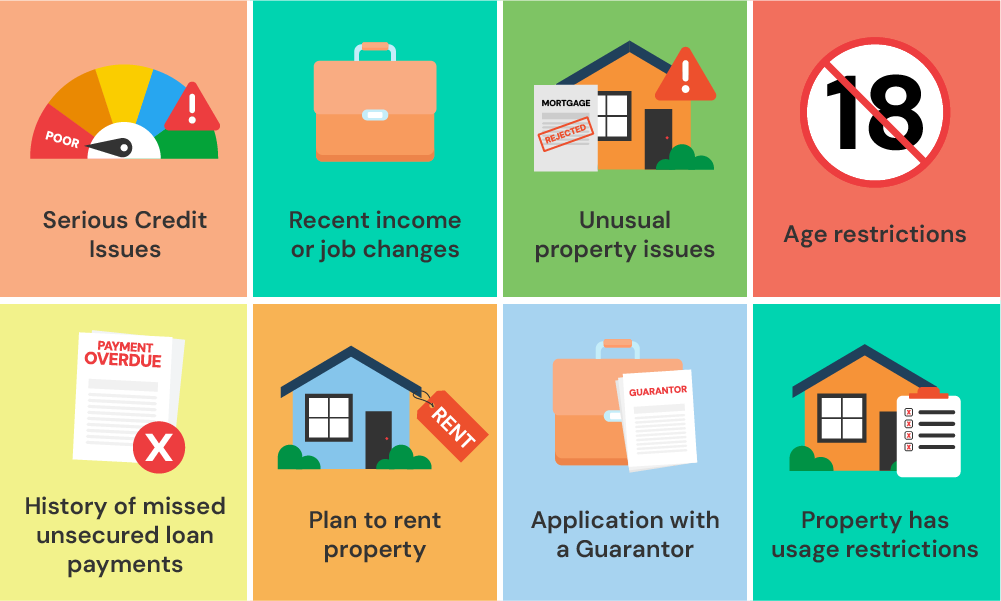
How Strict is NatWest Compared to Other Mortgage Lenders?
NatWest is pretty strict, but not more than most major banks in the UK. They do a thorough check on things like how much you earn and your past credit history.
NatWest is particularly careful if you’ve had credit problems in the past. They want to make sure you can pay back the mortgage and won’t lend if they think it’s too risky.
This means if your financial situation is a bit complicated, like if you’ve recently fixed your credit score or your job situation has changed, NatWest might be more cautious about giving you a mortgage.
What Should I Do If NatWest Declined My Mortgage Application?
If NatWest has said no to your mortgage application, it’s important not to rush into applying again straight away. Here’s what you can do:
Understand Why It Happened
Find out the exact reasons why NatWest didn’t approve your mortgage. It could be due to your credit history, your income, or something about the property you wanted to buy. Knowing this will help you figure out what to change for next time.
Take Time to Improve Your Situation
If the refusal is because of your financial situation, take some time to improve it. This could mean saving more for a deposit, working on your credit score, or waiting until you have a more stable job.
Consider Different Lenders
Different lenders have different rules. Just because NatWest said no, it doesn’t mean every lender will. Some might be more flexible or have different criteria that suit your situation better.
Seek Professional Advice
It might be a good idea to talk to a mortgage broker. They can give you advice on what to do next and might know lenders who are more likely to say yes to you.
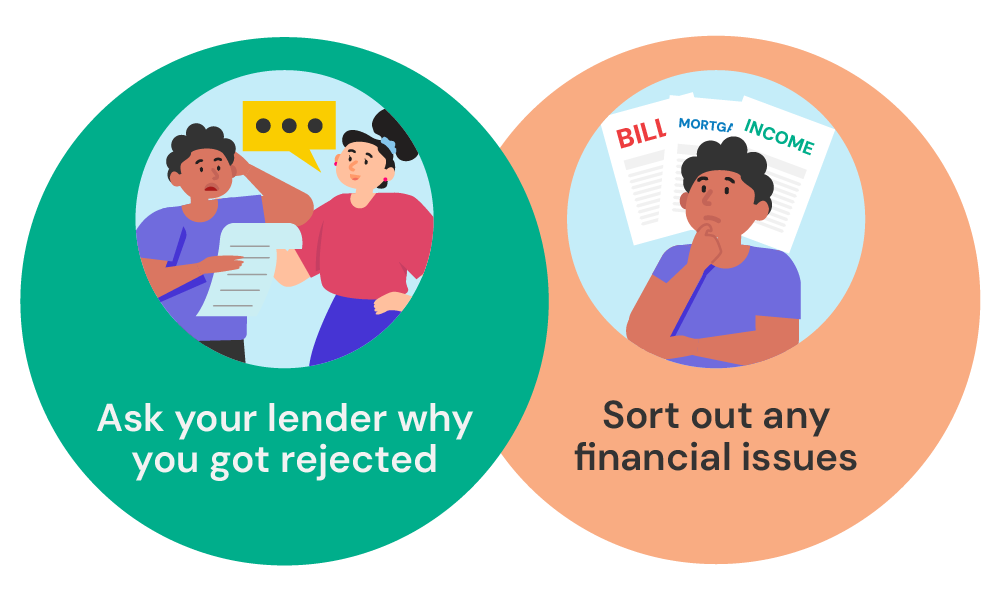
Can I Challenge NatWest’s Mortgage Refusal Decision?
Yes, you can appeal against their decision.
To begin the appeal process, it’s important to understand why your application was refused.
Gather all the information and feedback provided by NatWest regarding the refusal. This understanding is crucial to address the specific reasons for the decline effectively.
To appeal, you need to visit a NatWest branch in person. The best way to start is by using the NatWest branch locator here to find the nearest branch to you.
Once you locate your nearest branch, you can arrange a meeting to discuss your appeal.
It’s essential to note that appealing a decision does not guarantee that your application will be approved, but it provides an opportunity to present your case again, potentially with additional information or clarification.
Therefore, being well-prepared for your branch visit can make a significant difference in the outcome of your appeal.
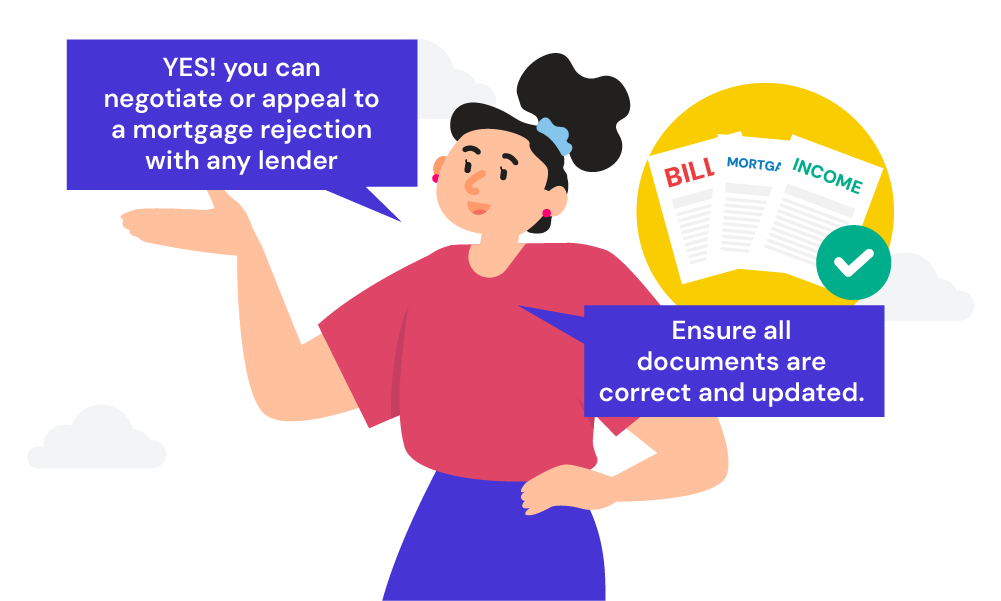
How Long Should I Wait Before Reapplying for a Mortgage with NatWest?
After a mortgage refusal from NatWest, it’s crucial to wait a bit before you reapply. This waiting period gives you time to address the reasons why your application was declined.
Typically, it’s a good idea to wait at least six months before reapplying. During this time, you should work on improving whatever aspects led to the refusal, like enhancing your credit score, saving more for a deposit, or stabilising your employment situation.
If the refusal was due to issues with the property, consider looking for a different property that meets NatWest’s lending criteria.
This waiting period also helps prevent your credit score from being negatively impacted by too many applications in a short time.
By taking this time to improve your circumstances, you’ll increase your chances of success when you reapply.
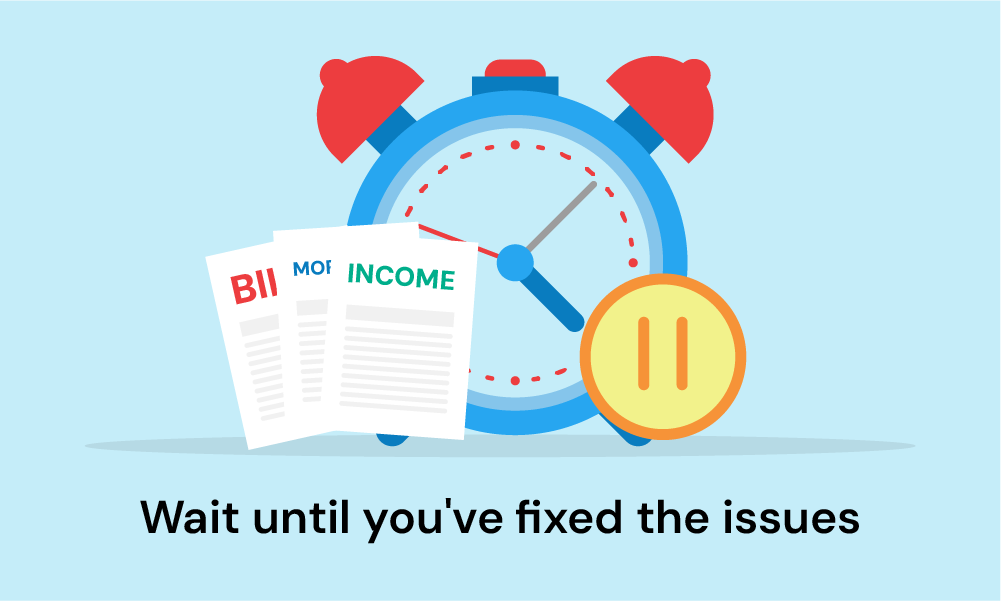
How Can I Improve My Chances of Getting Approved by NatWest in the Future?
If you want to improve your chances of getting a mortgage approved by NatWest in the future, focus on strengthening your financial profile. Here are some practical steps you can take:
- Improve Your Credit Score. Make sure you pay all your bills on time, reduce any outstanding debts, and avoid taking out new loans. Check your credit report for any errors and get them corrected.
- Save for a Larger Deposit. The more you can save for a deposit, the better your chances of approval. A larger deposit reduces the risk for the lender and can also get you better mortgage rates.
- Stabilise Your Employment. A steady job with a consistent income reassures lenders of your ability to repay the mortgage. If you’re self-employed, ensure your business accounts are in good order and show stable income.
- Reduce Unnecessary Spending. Cut back on non-essential expenses to improve your debt-to-income ratio. This shows lenders you’re responsible with money.
- Prepare Financial Documents. Keep all your financial documents, like bank statements and payslips, organised and up to date. This makes the application process smoother.
When Should I Seek Expert Mortgage Advice?
If you’re unsure about your mortgage application or if it gets declined, a mortgage expert can guide you. Here are some scenarios where their advice can be crucial:
- Low Deposit. If you have a smaller deposit, a mortgage expert can advise on the best options available for you.
- Bad Credit History. If your credit history isn’t great, a mortgage expert can help you find lenders who are more likely to approve your application.
- Complex Financial Situations. If you’re self-employed, have variable income, or have other complex financial circumstances, a mortgage expert can navigate through various lending criteria to find a suitable mortgage.
- First-Time Buyers. If you’re buying a home for the first time, the process can be overwhelming. Mortgage experts can explain everything and help you make informed decisions.
In these situations, getting professional advice can save you time and increase your chances of getting a favourable mortgage deal.
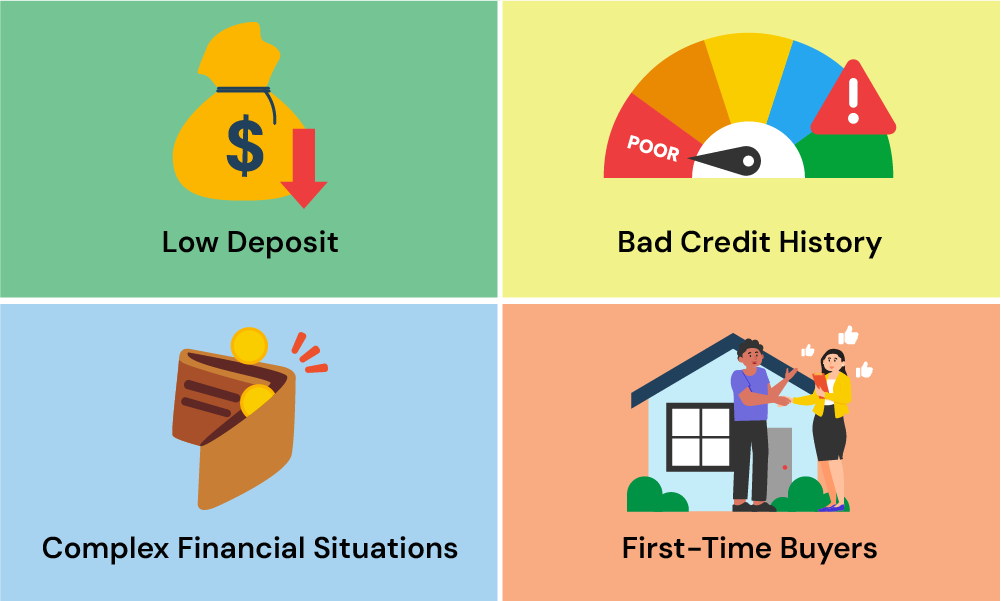
How Long Does NatWest Mortgage Application Process Take?
Generally, the entire process from application to getting a decision can take around two weeks. This timeframe can vary depending on your situation.
If your financial situation is straightforward and all your documents are in order, it could be quicker. However, if you have a complex financial background or if there are issues with the property, it could take longer.
It’s important to keep all your documents handy and respond promptly to any queries from NatWest to avoid delays.
What Happens After Receiving a Mortgage Offer from NatWest?
Once you receive a mortgage offer from NatWest, a few key steps follow before you can call the property your own.
Firstly, you’ll need to review and sign the mortgage contract. This contract outlines all the terms and conditions of your mortgage, so make sure you understand it fully before signing.
After signing the contract, your solicitor or conveyancer will handle the legal side of things. This includes transferring the property title to your name and handling the exchange of contracts with the seller’s solicitor. They will also arrange for the payment of stamp duty if applicable.
The final step is the completion of the sale. On the completion day, the mortgage funds are transferred from NatWest to the seller, and you’ll get the keys to your new home.
Your solicitor will inform you once everything is finalised, and that’s when you officially become the property owner.
Remember, throughout this process, staying in touch with your solicitor and NatWest is vital to ensure everything goes smoothly.
The Bottom Line
If NatWest has declined your mortgage application, don’t worry. There are many reasons why this might happen, like issues with your credit history or recent changes in your job. The important thing is to understand and address these reasons for your next application.
A mortgage advisor can be very helpful in this situation. They have in-depth knowledge of mortgages and can clearly explain why your application might have been refused. They’ll review your case and guide you on how to improve your application for the future.
If you’re feeling overwhelmed about your mortgage situation, speaking to a professional broker can ease your concerns.
Need help finding the right broker? Get in touch with us, and we’ll connect you with a qualified broker who can assist you.
Get Matched With Your Dream Mortgage Advisor...

Frequently asked questions
What happens to the valuation fee if my mortgage application is declined by NatWest?
If NatWest decides not to approve your mortgage application, they generally return the fee you paid for property valuation.
This refund, however, doesn’t apply if the reason for your application’s rejection is linked to issues found during the valuation itself. In such cases, the valuation fee is typically non-refundable.
Is it possible to use a gifted deposit for a NatWest mortgage?
NatWest is open to accepting deposits that are gifted to you, whether they come from family members or a close friend.
For deposits coming from friends, NatWest requires a written confirmation stating that you don’t have to pay back the gift and that the friend won’t hold any stake in your property.
This policy helps in clarifying the nature of your deposit and ensuring transparency in your financial commitments.
Could gambling affect my mortgage application with NatWest?
Your mortgage application’s success might be influenced by your gambling habits. NatWest reviews each case individually, so there’s no fixed rule about gambling activities.
If your financial records show significant gambling transactions, it may raise concerns about your financial stability. Each application is evaluated based on the overall strength of your financial background, and in some cases, other lenders might be more accommodating if gambling is a concern.
>> More about Does Gambling or Betting Affect Your Mortgage Application?



